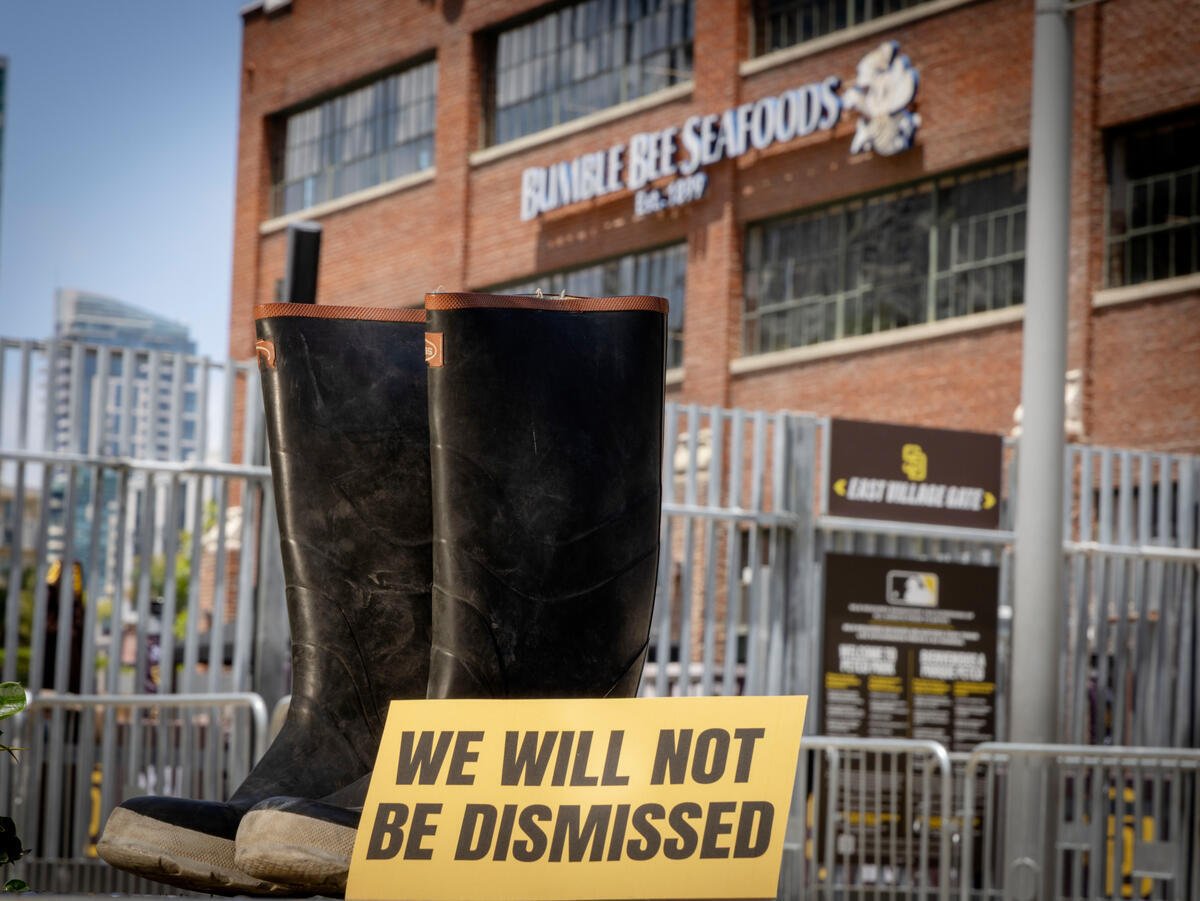San Diego, US – A group of Indonesian fishers who sued US tuna brand Bumble Bee have responded to the company’s motion to dismiss their suit, arguing they have a right to have their allegations heard in court. The fishers filed their suit in March, alleging years of forced labour while catching fish that was sold by one of the largest seafood companies in the US. In June, Bumble Bee filed a motion to dismiss the suit.
Sari Heidenreich, senior human rights advisor at Greenpeace USA, said: “The plaintiffs reply is clear—their case meets the high standards required by US law and should be heard by the court. I am confident they will prevail.”
The filing, submitted on 31 July 2025 local time, contends that the plaintiffs plausibly allege, and Bumble Bee does not dispute, that the plaintiffs were forced to labour by the vessel owners and argues the company was long specifically aware of such abuses in its supply chain, asserting this meets the Trafficking Victims Protection Reauthorization Act (TVPRA) standard. The reply also defends the plaintiffs’ negligence claims, stating Bumble Bee’s actions created both risk of forced labour and incentive for the vessel owners to abuse the plaintiffs.
The suit against Bumble Bee is brought under the TVPRA, which offers survivors who have experienced labour or human rights abuses a private right of action to sue US companies that knowingly sell goods produced on the back of their abuse. The four fishers allege conditions of forced labour, that they were held in debt bondage, denied fair wages, isolated at sea for months, and subjected to both physical and psychological abuse while catching tuna that was sold by Bumble Bee in the US. It is one of the first times the seafood industry has been challenged under the TVPRA in a US court.
According to the filing, Bumble Bee sources 95% to 100% of its albacore through its Taiwanese parent company, Fong Chun Formosa (FCF), and a ‘trusted network’ of vessels. The reply argues that many of the vessels in that network, including those the plaintiffs “were forced to work” on, fish exclusively for Bumble Bee. The plaintiffs argue their experiences reflect a broader pattern, partially enabled by Bumble Bee’s continued use of transshipment—a practice widely criticised by experts and increasingly abandoned by other major seafood companies due to its links to forced labour.[1]
“Rather than act to ensure that workers in their supply chain are protected from forced labor and abuse, Bumble Bee has attempted to sweep them aside through a procedural motion. This move is more than just a legal strategy; it is an attempt to avoid accountability, silence vulnerable workers, and protect corporate interests over human dignity,” said Heidenreich.
“Without attempting to remedy any harms that occurred on these vessels and improving that workplace for current and future workers, this is akin to the practice of ‘cut and run’, which experts agree is irresponsible and leaves workers in an even more vulnerable situation.”
Heidenreich continued, “A just and sustainable seafood industry must prioritise the well-being of all its stakeholders—from the migrant fishers working under dangerous conditions to the American consumers who have made it clear: they do not want seafood tainted by modern slavery or environmental destruction.”
A letter expressing solidarity with these individuals was also released today by 45 organisations from eight countries. The signatories, which include the International Transport Workers’ Federation (ITF) and seven other unions, Environmental Justice Foundation and Friends of the Earth, condemn human trafficking, while expressing support for the right of all individuals to seek justice and demand accountability; and highlight the essential and inseparable relationship between healthy oceans and decent work.
According to Greenpeace Indonesia Oceans Campaigner Fildza Nabila Avianti, this issue is not just about one company or four migrant fishers, but reflects a broader problem within the global fishing industry. This issue needs to be resolved to uphold justice and prevent similar cases that are likely ongoing and will recur in the future.
“Indonesia’s protection of migrant workers is weak, especially when the violations take place abroad and involve corporations in the global supply chain. We call on the Indonesian government to take stronger action to protect workers, including by ratifying C-188, the International Labour Organisation’s Working in Fishing Convention,” Fildza said.
The International Labour Organisation (ILO) estimated in its 2022 report that at least 128,000 fishers worldwide are victims of forced labour.[2] The report also emphasised a strong connection between forced labour and other crimes related to fisheries, such as illegal, unreported, and unregulated (IUU) fishing.[3] IUU and destructive fishing activities significantly contribute to the worsening of the ocean and climate crises.[4]
ENDS
Photos and videos are available in the Greenpeace Media Library.
Notes:
[1] A Global Analysis of Transshipment 2021 (pdf), Global Fishing Watch
[2] ILO 2022 report estimates at least 128,000 fishers worldwide are victims of forced labour
[3] ILO on the connection between forced labour and other crimes related to fisheries
[4] IUU fishing creates a vicious cycle of declining fish stocks, causing fishing vessels to venture farther out to sea and remain there for longer periods in order to maintain profitability. The isolation of spending months, and sometimes years, at sea creates an environment that is conducive to labour abuse, forced labour, and human trafficking. These issues lead to a downward spiral, as forced labour is often used to reduce labour costs, allowing otherwise unprofitable vessels to continue depleting the oceans.
Contacts:
Vela Andapita, Global Communications Coordinator, Beyond Seafood campaign, Greenpeace Southeast Asia, +62 817 5759 449 (UTC+8), [email protected]
Tanya Brooks, Senior Communications Specialist at Greenpeace USA, (+1) 703-342-9226, [email protected]
Greenpeace International Press Desk, +31 (0) 20 718 2470 (available 24 hours), [email protected]
Source link
Greenpeace International www.greenpeace.org

